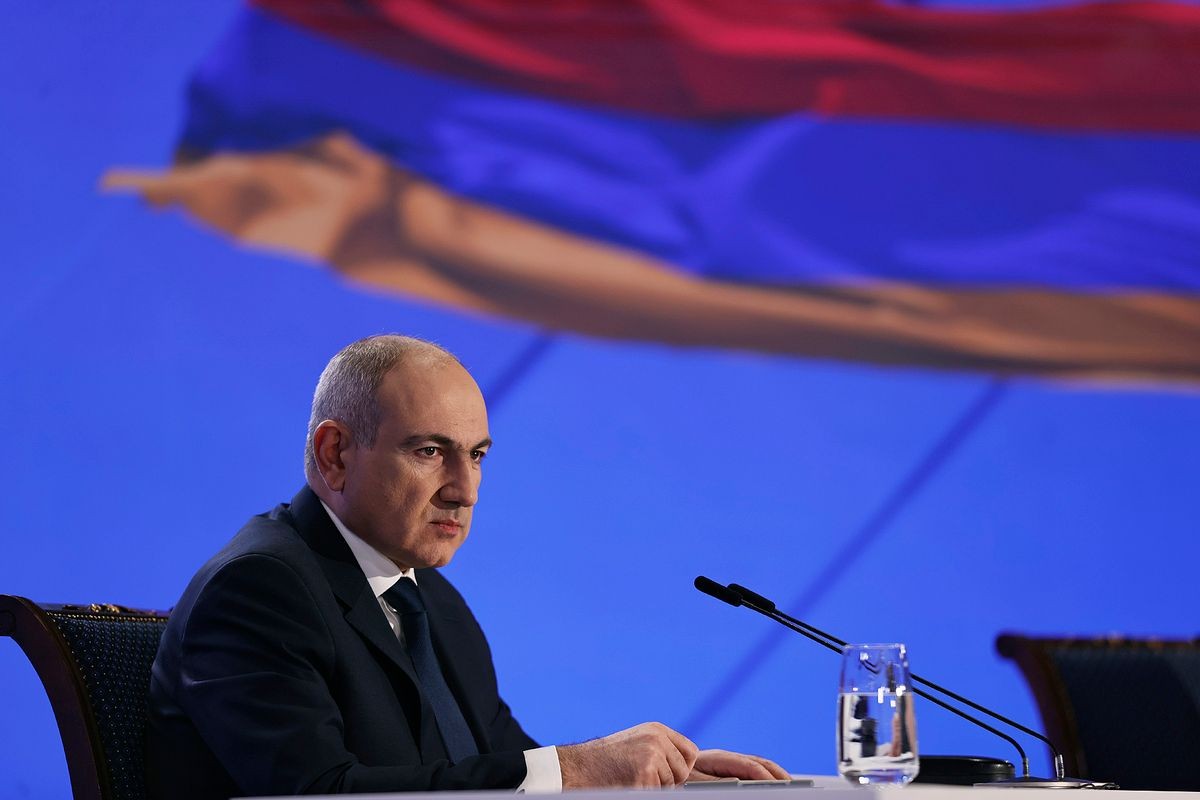
Amidst the crisis between the Armenian government and the Armenian Apostolic Church, a new survey commissioned by the International Republican Institute (IRI) has found that Armenians are largely satisfied with the church. In addition, while Prime Minister Nikol Pashinyan was the most trusted politician in Armenia, his popularity, as well as that of his Civil Contract party, has declined.
The data was collected via telephone administered interviews with 1,505 Armenian residents and Nagorno-Karabakh refugees from 16–26 June. The results of the survey were published on Monday.
According to the results, Pashinyan was the most trusted politician in Armenia, with 13% of respondents expressing confidence in him. He was followed by Foreign Minister Ararat Mirzoyan, with 5%, and opposition leader and former President Robert Kocharyan with 4%.
Notably, 61% of respondents said they did not trust any political figure.
Support for Pashinyan and his Civil Contract party declined to 17%, down from 20% in both 2023 and 2024. In contrast, the rating of Kocharyan’s Armenia Alliance faction doubled, rising from 2% to 4%.
Amidst the crisis between the Armenian government and the Armenian Apostolic Church, which has escalated since late May, survey data showed that the church was the institution with the second-most level of approval in Armenia, with 58% of respondents expressing satisfaction with its work. Respondents were most satisfied with the Armenian Armed Forces, which received an approval of 72%.
Meanwhile, only 38% of respondents expressed satisfaction with the Prime Minister’s office, a continued decline from over 80% in the aftermath of the 2018 Velvet Revolution.
The courts were the only public institution where the public have consistently been dissatisfied since August 2018 — according to the latest data, 52% of respondents were dissatisfied, while only 31% were satisfied.
Despite criticism and protests against the government’s handling of social assistance, 55% of respondents said they were satisfied with the Armenian government’s support programmes for displaced Armenians from Nagorno-Karabakh, while 36% expressed dissatisfaction.
In addition, the IRI survey noted that they ‘found signs of increasing political disengagement among young Armenians, with 37% of youth (age 18 to 35) responding that they would not vote if national parliamentary elections were held next Sunday’.
The report quoted Stephen Nix, Senior Director for Europe and Eurasia at IRI, as saying that the Armenian government ‘should undertake serious efforts to involve Armenian youth in the political and electoral processes’.
Russia is still seen as a political threat
Despite the apparent favourable turn in Armenia–Russia relations, following a freefall that started after lack of support in light of the Azerbaijani attack towards Armenia in 2021 and 2022, Armenians still view Russia as a political threat, behind just Azerbaijan, Turkey, and Israel.
When asked about the signing of a peace treaty with Azerbaijan, 47% of respondents supported such a move while 40% opposed it.
Those against the signing of a peace deal mentioned security issues, risks of war, the cession of territories to Azerbaijan, a lack of trust, and that the terms of the agreement are dictated only by Azerbaijan as the main disadvantages to such an agreement.
Separately, Armenia’s prospective membership in the EU enjoys broad support, with 49% of respondents saying they would vote in favour and only 15% opposed.
Among those who expressed support for Armenia’s accession to the EU, the main perceived benefits were strengthening the country’s security, stability, and economy, and developing the country.
In contrast, opponents of EU membership cited several concerns, including the deterioration of traditional Armenian family values, problems related to preserving national identity, the emergence of security problems, a negative impact on the economy, and risks of ‘angering’ Russia.
Indeed, national security and border issues were considered to be the main problem that Armenia currently faces, with 44% expressing such a standpoint. Unemployment was the next biggest issue, receiving 14%, while political instability — 12% — was the third largest problem.

This article was translated into Azerbaijani and republished by our partner Meydan TV.










